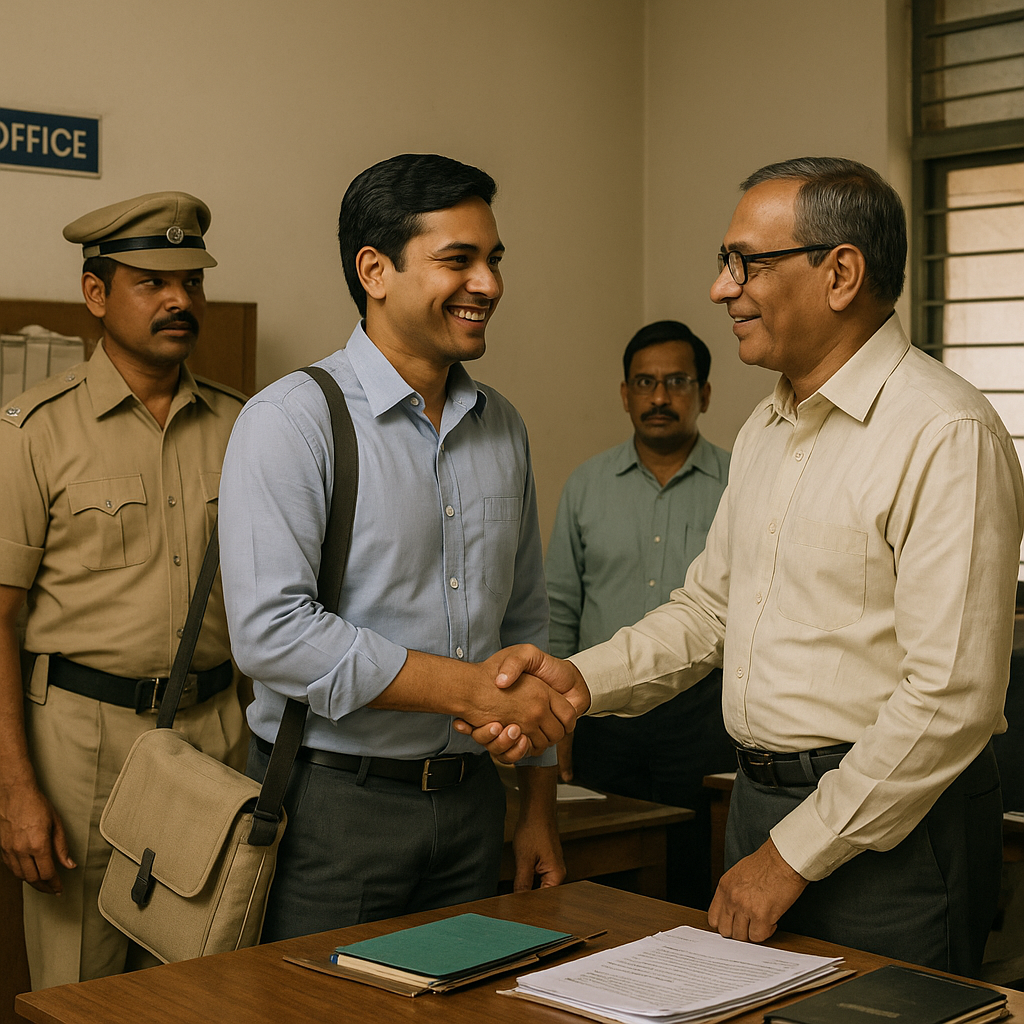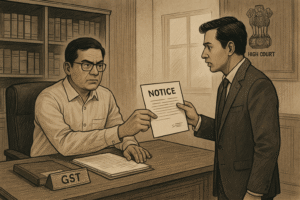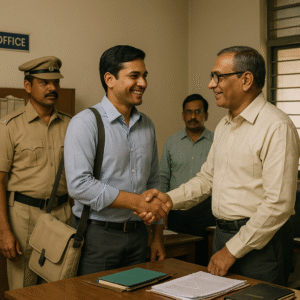The Patna High Court in 2025 quashed a departmental dismissal order passed against a government employee of the Minor Water Resources Department who had been accused of taking a bribe of ₹2,500 in a vigilance trap case. The Court held that the entire disciplinary proceeding was conducted in violation of the Bihar Government Servants (Classification, Control and Appeal) Rules, 2005, that there was no legally admissible evidence recorded in the inquiry, that key witnesses were not examined, and that the disciplinary and appellate authorities passed non-speaking, mechanical orders. As a result, the Court set aside the dismissal and directed the authorities to reinstate the petitioner with all consequential benefits, including under Rule 13(3) of the 2005 Rules and in line with the Supreme Court ruling in Deepali Gundu Surwase v. Kranti Junior Adhyapak Mahavidyalaya.
The judgment is important for government servants in Bihar because it clarifies that: (i) even in vigilance or trap cases, the department must strictly follow the CCA Rules, 2005; (ii) a criminal acquittal on the very same facts, witnesses and documents cannot be ignored in departmental proceedings; and (iii) appellate authorities cannot merely copy the opinion of the Law Department without giving their own reasons.
- Simplified Explanation of the Judgment
The case arose out of an allegation made in 2005 against a government employee working as a correspondence clerk in the Minor Irrigation Division. The employee had been appointed earlier on compassionate grounds. A complaint was made to the Vigilance Department that he was demanding illegal gratification to process a file for compassionate appointment of someone else. On the basis of that complaint, a trap was laid and the employee was arrested allegedly while receiving ₹2,500. A vigilance police case was registered under the Prevention of Corruption Act, 1988. After the arrest, the department placed the employee under suspension.
Soon after his release from custody, the department issued a memo of charge in 2006 and asked him to reply. He did reply and asked the department to keep the departmental proceeding in abeyance till the criminal case was decided, since both were based on the same incident and the same set of facts. After that, the matter remained pending for a very long time. Nearly eight years later, in 2014, the department suddenly revived the departmental proceeding, again placed him under suspension, appointed a new inquiry officer, obtained an inquiry report and, based on that, the disciplinary authority dismissed him from service by Memo No. 1042 dated 18.06.2014. His statutory appeal was also rejected in 2019.
The aggrieved employee approached the High Court. During this period, a very crucial development took place: the criminal vigilance case against him was decided in 2016 by the Special Judge, Vigilance, Patna, and he was acquitted honourably. The trial court, after examining as many as 17 witnesses and the trap-related documents (pre-trap memo, post-trap memo, complaint etc.), came to a clear finding that the prosecution failed to prove demand, acceptance and recovery, and that the story of the trap itself was doubtful because even the time of arrest and the time of arrival at the police station were not tallying. The trial court therefore acquitted him.
When this acquittal was brought to the notice of the Patna High Court in his earlier writ, the High Court had directed the Appellate Authority to reconsider his departmental appeal in the light of the Supreme Court decisions in Capt. M. Paul Anthony v. Bharat Gold Mines Ltd. and G.M. Tank v. State of Gujarat, both of which say that when the criminal case and the departmental case are based on the same facts, witnesses, documents and allegations, and the criminal court has acquitted the employee after a full-fledged trial, the department cannot lightly maintain its own finding of guilt on no evidence.
However, when the matter went back to the department, the Appellate Authority simply obtained an opinion from the Law Department and again rejected the employee’s appeal by Memo No. 7466 dated 17.10.2019, without really discussing his grounds, without comparing the evidence and without considering whether the charge could still stand when the vigilance court had already said that demand and recovery were not proved.
The Patna High Court, while dealing with the final writ petition, examined the entire record — charge memo, inquiry report, dismissal order and appellate order — and found several fundamental defects:
- Violation of Rule 17(3) and (4) of the Bihar CCA Rules, 2005: The charge-sheet did not contain the mandatory list of documents and list of witnesses through whom the charge was to be proved. This alone goes to the root of a major penalty proceeding.
- No real evidence was recorded in the inquiry: The so-called trap witnesses (the two seizure-list witnesses) were examined in the departmental proceeding but both of them clearly stated that they had not seen the petitioner accepting any bribe and that they were asked to sign papers later at the police station. The complainant was never examined. No member of the vigilance trap team was examined. Without examining such witnesses, the inquiry officer simply relied on the FIR, the complaint and the trap memos to hold the charge proved. The High Court held, following Roop Singh Negi v. Punjab National Bank, that an FIR or documents collected in police investigation cannot, by themselves, become evidence in a departmental proceeding unless the person who made them is examined and subjected to cross-examination.
- Inordinate delay and complete disregard of Government’s own circulars: The Court noted, in strong words, that although the General Administration Department of the Government of Bihar had issued several circulars directing that vigilance/trap-related departmental proceedings must be completed within about eight months, the department in this case kept it pending for over a decade. This, the Court said, is a violation of the employee’s right to speedy conclusion of proceedings and contrary to Article 21.
- Non-speaking orders: The disciplinary authority dismissed the employee with just a bald statement that his explanation was not satisfactory. The appellate authority too did not apply its own mind and merely echoed the opinion of the Law Department. The Court said that an appellate authority is not a post office; it must deal with the specific grounds taken by the employee.
- Effect of criminal acquittal: The High Court pointed out that the criminal case and the departmental case were mirror images — same year, same trap, same amount, same complainant, same vigilance team, same allegation of demand and acceptance. The criminal court, after examining 17 witnesses, held that the prosecution “miserably failed” to prove its case and even found that the time-line of arrest was doubtful. In such a situation, as explained by the Supreme Court in G.M. Tank, Capt. M. Paul Anthony and the more recent Ram Lal v. State of Rajasthan, it would be oppressive and unfair to sustain a departmental finding of guilt on no evidence.
On these findings, the Patna High Court set aside both orders — (i) dismissal order dated 18.06.2014 and (ii) appellate order dated 17.10.2019 — and directed reinstatement with all consequential benefits, expressly referring to Rule 13(3) of the 2005 Rules and to the Supreme Court judgment in Deepali Gundu Surwase, which clarifies that when termination/dismissal is quashed, back wages and continuity of service normally follow, unless there are exceptional circumstances.
- Significance or Implication of the Judgment (For general public or government)
- The judgment serves as a reminder to all Bihar departments that even in corruption-related cases, they must conduct departmental proceedings fairly, within time, and in accordance with Rule 17 of the CCA Rules, 2005.
- It protects government servants from perfunctory inquiries where no real witness is examined and documents are simply taken on file.
- It reinforces that when a vigilance court acquits an employee on the very same material, the department cannot maintain a parallel conviction by saying “standards of proof are different,” unless it actually has independent evidence.
- For the government, it is a nudge to enforce its own time-bound instructions for trap cases, so that either the guilty are punished quickly or the innocent are cleared quickly.
- For employees appointed on compassionate grounds or working in lower posts, it is reassuring that the High Court will intervene if departmental authorities act mechanically.
- Legal Issue(s) Decided and the Court’s Decision with Reasoning
- Whether a major penalty proceeding can continue on a charge-sheet that does not contain a list of documents and witnesses as required by Rule 17(3) & (4), Bihar CCA Rules, 2005?
- Decision: No. Such non-compliance goes to the root of the inquiry and makes the proceeding vulnerable.
- Whether an inquiry officer can prove a vigilance trap only on the basis of FIR, complaint, pre-trap and post-trap memos without examining the complainant or vigilance officers?
- Decision: No. Documents collected during investigation are not automatically “evidence”; they must be proved through witnesses.
- Whether the disciplinary authority’s and appellate authority’s non-speaking orders are sustainable?
- Decision: No. Orders imposing civil consequences must show application of mind and reasoning.
- Whether criminal acquittal on identical facts, witnesses and circumstances can be ignored by the department?
- Decision: No. Where the criminal and departmental proceedings are mirror images, and the criminal court has on merits found that the prosecution failed to prove demand and recovery, it would be unjust and oppressive to sustain the departmental finding.
- Relief: Dismissal order and appellate order set aside; direction to reinstate with all consequential benefits in terms of Rule 13(3) and Deepali Gundu Surwase.
- Judgments Referred by Parties
- Capt. M. Paul Anthony v. Bharat Gold Mines Ltd. & Ors., (1999) 3 SCC 679 (referred to show that where criminal and departmental cases are based on same set of facts, acquittal has bearing)
- G.M. Tank v. State of Gujarat & Ors., (2006) 5 SCC 446
- Roop Singh Negi v. Punjab National Bank & Ors., (2009) 2 SCC 570
- Kerns Services (P) Ltd. v. State of Bihar & Ors., 2014 (1) PLJR 622
- Judgments Relied Upon or Cited by Court
- Roop Singh Negi v. Punjab National Bank & Ors., (2009) 2 SCC 570
- State of Uttar Pradesh & Ors. v. Saroj Kumar Sinha, (2010) 2 SCC 772
- Commissioner of Police, Delhi & Ors. v. Jai Bhagwan, (2011) 6 SCC 376
- G.M. Tank v. State of Gujarat & Ors., (2006) 5 SCC 446
- Capt. M. Paul Anthony v. Bharat Gold Mines Ltd., (1999) 3 SCC 679
- Ram Lal v. State of Rajasthan & Ors., (2024) 1 SCC 175
- Deepali Gundu Surwase v. Kranti Junior Adhyapak Mahavidyalaya & Ors., (2013) 10 SCC 324
- Case Title
- Mukesh Kumar v. State of Bihar & Ors.
- Case Number
- Civil Writ Jurisdiction Case No. 2114 of 2020 (Patna High Court)
- Citation(s)
- 2025 (2) PLJR 96
- Coram and Names of Judges
- Hon’ble Mr. Justice Harish Kumar
- Names of Advocates and who they appeared for
- For the petitioner: Mr. Parijat Saurav, Advocate
- For the State/respondents: Mr. Krityanand Jha, Advocate
- Link to Judgment
MTUjMjExNCMyMDIwIzEjTg==-viO8YM–ak1–gIXY=
If you found this explanation helpful and wish to stay informed about how legal developments may affect your rights in Bihar, you may consider following Samvida Law Associates for more updates.








